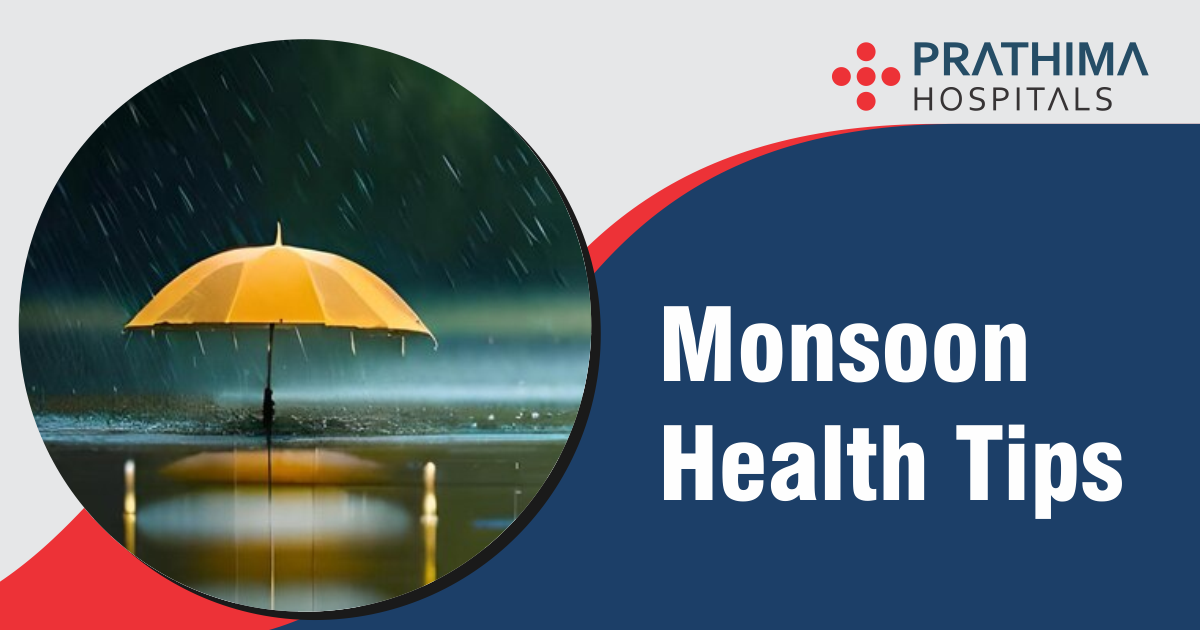How to Stay Healthy During Monsoon?

Monsoon Health Tips
Introduction:
As the monsoon season arrives, bringing with it refreshing showers and verdant landscapes, there’s a distinct sense of renewal after the scorching heat. However, this picturesque time also ushers in an elevated risk of various illnesses due to the heightened humidity and stagnant water as per the Best General Physician in Hyderabad. These conditions create an ideal breeding ground for bacteria, viruses, and fungi. To make the most of this captivating season while safeguarding your health, it’s imperative to adopt a proactive approach to wellness. In this article, we’ll delve into a comprehensive set of tips designed to help you maintain your well-being during the monsoon.
1. Maintain Personal Hygiene:
Maintaining personal hygiene is a fundamental aspect of staying healthy, especially during the monsoon season when the risk of infections is higher due to the increased humidity and moisture. Proper personal hygiene practices not only protect you from illnesses but also contribute to your overall well-being. Let’s delve into the details of how to maintain personal hygiene effectively during the monsoon:
- Hand Hygiene: Washing hands frequently and properly is one of the simplest yet most effective ways to prevent the spread of germs and infections. Utilize soap along with flowing water to cleanse your hands for a duration of at least 20 seconds. Pay attention to the areas between your fingers, under your nails, and on the back of your hands. Teach this practice to children as well as instil good hygiene habits from an early age.
- Bathing: Taking regular showers helps to remove sweat, dirt, and bacteria from your skin, keeping it clean and preventing skin infections. Use a mild soap or body wash to cleanse your body thoroughly, paying extra attention to areas prone to sweating, such as the underarms, groin, and feet.
- Oral Hygiene: According to the Best General Physician in Kukatpally, your mouth is a breeding ground for bacteria, which can lead to oral infections and bad breath. Remember to brush your teeth a minimum of twice daily, ideally after meals, utilizing toothpaste containing fluoride. Additionally, ensure you clean your gums and tongue for comprehensive oral care. Use dental floss to remove food particles stuck between your teeth, and rinse your mouth with an antiseptic mouthwash for added protection.
- Nail Care: Trim your nails regularly to prevent dirt and bacteria from accumulating beneath them. Long nails can easily harbour germs, which can then enter your body through your mouth as you touch your face or consume food.
- Hair Care: Humidity during the monsoon can lead to an itchy and oily scalp, which might result in dandruff and fungal infections. Shampoo your hair regularly using a mild, anti-dandruff or anti-fungal shampoo to keep your scalp clean and healthy. Use a conditioner to prevent hair from becoming dry and brittle.
- Clothing and Footwear: Wear clean, dry clothing to prevent fungal infections and body odour. Ensure your clothes are made of breathable fabrics that allow air circulation. Avoid wearing wet or damp clothes for prolonged periods, as they can promote bacterial and fungal growth. Your footwear should also be clean and dry to prevent fungal infections like athlete’s foot. Opt for footwear with open toes to provide your feet with the opportunity to breathe freely.
- Feminine Care: Women should prioritize maintaining appropriate feminine hygiene to avoid the risk of infections. Change sanitary napkins or tampons regularly during your menstrual cycle, and wash the genital area with mild soap and water. Avoid using strongly scented products, as they can disrupt the natural pH balance of the area.
- Hand Sanitizers: In situations where soap and water are not readily available, use alcohol-based hand sanitisers to clean your hands. Make sure the sanitiser contains at least 60% alcohol and covers all surfaces of your hands.
- Skin Care: Moisture and humidity can lead to skin infections, so it’s essential to keep your skin dry and well-maintained. Use a gentle, pH-balanced cleanser to wash your face, followed by a suitable moisturizer. Avoid using heavy cosmetics that can clog your pores and exacerbate skin issues.
- Avoid Sharing Personal Items: During the monsoon, the risk of infections spreading through shared personal items, like towels, razors, and brushes, increases. Avoid sharing these items with others to prevent the transmission of germs.
- Washing Clothes and Linens: Clothes, bed linens, and towels can accumulate bacteria and fungi if not washed properly. Wash them regularly using warm water and detergent, and make sure they are completely dry before using them again.
- Treating Cuts and Wounds: Any cuts, wounds, or scratches should be promptly cleaned with antiseptic solutions and covered with sterile dressings to prevent infection. Moist conditions during the monsoon can delay wound healing and increase the risk of infection.
2. Stay Hydrated: Although the weather might not be as hot as summer, the humidity can still lead to dehydration. Drink a sufficient quantity of water throughout the day to maintain proper hydration. Herbal teas, infused water, and coconut water can also be excellent choices to replenish electrolytes and keep your body well-hydrated.
3. Consume Nutrient-Rich Foods: Boosting your immunity is essential during the monsoon to ward off potential illnesses. As suggested by the Best General Physician in Kachiguda, include a variety of fruits and vegetables rich in vitamin C (such as citrus fruits, berries, and bell peppers) and antioxidants to enhance your body’s defence mechanism. Adequate protein intake from sources like lean meats, fish, eggs, and legumes supports tissue repair and immune function.
4. Be Cautious with Food: During the monsoon, there’s an increased risk of food contamination due to the high moisture levels. Avoid consuming street food and uncooked salads, as these can harbour harmful bacteria. Choose freshly prepared, warm meals cooked under sanitary conditions. Washing fruits and vegetables thoroughly before consumption is crucial to remove any residual pesticides or contaminants.
5. Manage Mosquito Exposure: Mosquito-borne illnesses such as dengue and malaria are prevalent during the monsoon. Wear full-sleeved clothing and use mosquito repellents to minimize exposure, especially during the early morning and late evening when mosquito activity is higher. Ensure your living spaces have proper screens on windows and doors to keep mosquitoes out.
6. Prevent Fungal Infections: Humidity and dampness create an ideal breeding ground for fungal infections, particularly in areas such as the groin, feet, and armpits. Keep these areas dry by using absorbent powders and wearing loose, breathable clothing. Use antifungal creams and powders if you notice any signs of infection.
7. Maintain Clean Surroundings: Stagnant water is a breeding ground for disease-carrying mosquitoes. Regularly clean and drain areas where water tends to accumulate, such as flower pots, bird baths, and gutters. Ensuring good drainage around your living space can significantly reduce the risk of waterborne diseases.
8. Boost Immunity: A strong immune system is your body’s best defence against infections. Besides a nutritious diet, ensure you get enough sleep, engage in regular physical activity, and manage stress through techniques like meditation and deep breathing. Adequate sleep helps the body recover and rejuvenate, while exercise enhances circulation and immune cell activity.
9. Avoid Walking in Rainwater: While it may be tempting to walk in the rain, it’s best to avoid doing so. Rainwater can carry various contaminants and pollutants, which can lead to skin infections and other illnesses. If you get wet, make sure to dry off quickly and change into dry clothes.
10. Stay Updated with Vaccinations: Certain vaccinations can provide added protection against seasonal illnesses. Consult your healthcare provider to ensure that you are up-to-date with vaccinations that are relevant for the monsoon season, such as flu shots.
11. Stay Informed: Keep an eye on weather forecasts and health advisories in your area. This can help you stay prepared for any extreme weather conditions and outbreaks of diseases that are common during the monsoon.
12. Stay Active Indoors: Monsoon rains might disrupt your outdoor exercise routine. However, staying physically active is still crucial for your overall health. Engage in indoor workouts, such as yoga, stretching exercises, or home workouts, to keep your body active and energized.
13. Maintain Good Respiratory Health: Humidity can exacerbate respiratory conditions like asthma and allergies. If you have such conditions, make sure to follow the Best General Physician in KPHB, advice and keep your inhalers or medications handy. Avoid exposure to allergens, like mould and dust mites, by keeping your living space clean and well-ventilated.
14. Regular Health Check-ups: Periodic health check-ups can help identify any underlying health issues early on, allowing for timely intervention. This is particularly important during the monsoon, as many illnesses can manifest with similar symptoms.
Conclusion:
Monsoon, while a much-awaited season, demands extra care and attention to maintain good health. By following these comprehensive tips, you can enjoy the beauty and charm of the rains while safeguarding yourself and your loved ones from the potential health risks that come with the monsoon. Remember, a proactive approach towards health during this season can go a long way in ensuring a joyful and illness-free monsoon experience.
.
.
.
.
.
For more details:
📞:: 733 733 6600 | 040 4345 4345
🌐:: https://prathimahospitals.com/book-appointment/






Warning: Undefined variable $req in /home/u885608126/domains/prathimahospitals.com/public_html/wp-content/themes/prathimahospitals/functions.php on line 294
Warning: Undefined variable $commenter in /home/u885608126/domains/prathimahospitals.com/public_html/wp-content/themes/prathimahospitals/functions.php on line 295
Warning: Trying to access array offset on value of type null in /home/u885608126/domains/prathimahospitals.com/public_html/wp-content/themes/prathimahospitals/functions.php on line 295
Warning: Undefined variable $aria_req in /home/u885608126/domains/prathimahospitals.com/public_html/wp-content/themes/prathimahospitals/functions.php on line 295
Warning: Undefined variable $req in /home/u885608126/domains/prathimahospitals.com/public_html/wp-content/themes/prathimahospitals/functions.php on line 298
Warning: Undefined variable $commenter in /home/u885608126/domains/prathimahospitals.com/public_html/wp-content/themes/prathimahospitals/functions.php on line 299
Warning: Trying to access array offset on value of type null in /home/u885608126/domains/prathimahospitals.com/public_html/wp-content/themes/prathimahospitals/functions.php on line 299
Warning: Undefined variable $aria_req in /home/u885608126/domains/prathimahospitals.com/public_html/wp-content/themes/prathimahospitals/functions.php on line 300
Warning: Undefined variable $commenter in /home/u885608126/domains/prathimahospitals.com/public_html/wp-content/themes/prathimahospitals/functions.php on line 303
Warning: Trying to access array offset on value of type null in /home/u885608126/domains/prathimahospitals.com/public_html/wp-content/themes/prathimahospitals/functions.php on line 303